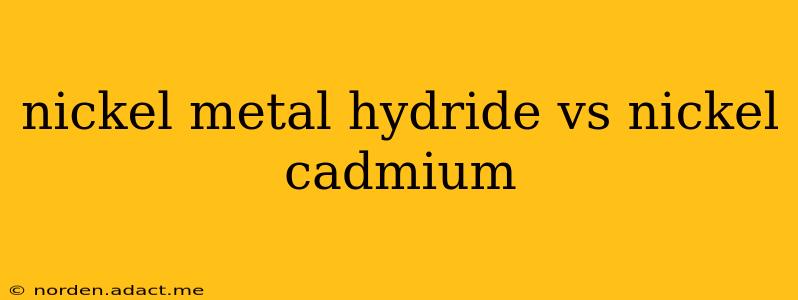Choosing the right rechargeable battery can be a daunting task, especially with so many options available. Two prominent contenders in the rechargeable battery arena are Nickel Metal Hydride (NiMH) and Nickel Cadmium (NiCd). While both offer rechargeable power, they differ significantly in their performance, environmental impact, and overall lifespan. This detailed comparison will delve into the key differences, helping you make an informed decision based on your specific needs.
What are Nickel Metal Hydride (NiMH) Batteries?
NiMH batteries are a type of rechargeable battery that utilizes a nickel oxide hydroxide cathode and a hydrogen-absorbing alloy anode. They offer a higher energy density than their NiCd counterparts, meaning they can store more energy for the same size and weight. This makes them a popular choice for many applications.
What are Nickel Cadmium (NiCd) Batteries?
NiCd batteries, an older technology, employ a nickel oxide hydroxide cathode and a cadmium anode. While robust and reliable, they suffer from several drawbacks compared to NiMH, some of which we'll explore below.
NiMH vs. NiCd: Key Differences
Here's a breakdown of the crucial differences between NiMH and NiCd batteries:
Energy Density:
- NiMH: Offers significantly higher energy density, providing longer runtime for the same size battery.
- NiCd: Possesses lower energy density, resulting in shorter runtimes compared to NiMH.
Memory Effect:
- NiMH: While early NiMH batteries suffered from a mild memory effect (reduced capacity if repeatedly discharged only partially), modern low self-discharge NiMH batteries have largely mitigated this issue.
- NiCd: Known for a pronounced memory effect. Repeatedly charging a partially discharged NiCd battery could permanently reduce its capacity.
Self-Discharge Rate:
- NiMH: Standard NiMH batteries exhibit a noticeable self-discharge rate, losing a significant portion of their charge over time (even when not in use). Low self-discharge NiMH batteries address this significantly.
- NiCd: Have a lower self-discharge rate compared to standard NiMH, retaining charge better over extended periods of inactivity.
Toxicity and Environmental Impact:
- NiMH: Considered environmentally friendlier due to the absence of toxic cadmium. They are also generally easier to recycle.
- NiCd: Contain cadmium, a highly toxic heavy metal. Disposal of NiCd batteries requires special precautions due to environmental concerns. Many countries have implemented regulations restricting their use and disposal.
Cost:
- NiMH: Generally more expensive upfront than comparable NiCd batteries.
- NiCd: Typically cheaper to purchase initially.
Operating Temperature:
- NiMH: Generally have a wider operating temperature range compared to NiCd batteries, performing well in both hot and cold conditions.
- NiCd: May experience reduced performance in extreme temperatures.
Which Battery is Right for You?
The optimal choice depends heavily on your specific needs and priorities:
-
Choose NiMH if: You prioritize longer runtimes, a higher energy density, and environmentally friendly options. Low self-discharge NiMH batteries are ideal for applications requiring infrequent use.
-
Choose NiCd if: Cost is a primary concern and you need a battery that retains charge well over long periods of inactivity (despite the memory effect). Note that NiCd's environmental impact should be a significant consideration.
Frequently Asked Questions (FAQs)
Can I mix NiMH and NiCd batteries in the same device?
No, you should never mix NiMH and NiCd batteries in the same device. They have different voltage characteristics, and mixing them can lead to damage to the device or the batteries themselves.
Are NiMH batteries better than NiCd batteries?
In most modern applications, NiMH batteries are superior due to their higher energy density, reduced memory effect, and more environmentally friendly nature. However, NiCd batteries still hold a niche for specific applications where cost and low self-discharge are paramount.
How long do NiMH and NiCd batteries last?
The lifespan of both NiMH and NiCd batteries depends on usage, charging cycles, and storage conditions. Generally, both can last for several hundred charge-discharge cycles before experiencing significant capacity degradation. Proper care and maintenance can extend their longevity.
How do I dispose of NiMH and NiCd batteries responsibly?
Always dispose of NiMH and NiCd batteries responsibly by following local regulations. Recycling programs are often available for both battery types. Never throw them in regular household trash.
By carefully considering the factors outlined above, you can make an informed decision between NiMH and NiCd batteries, selecting the option that best fits your needs and preferences. Remember to always prioritize responsible disposal to minimize environmental impact.
